Reviews
 Evita is one of those musicals that has been enjoyed by so many audiences over so many years that it can genuinely be described as part of the public consciousness. Don’t cry for me Argentina was such a pop chart success that even avowed musical theatre avoiders can hum the chorus.
Evita is one of those musicals that has been enjoyed by so many audiences over so many years that it can genuinely be described as part of the public consciousness. Don’t cry for me Argentina was such a pop chart success that even avowed musical theatre avoiders can hum the chorus.
How charming then to be presented with this fresh and thoughtful revival from Cassio Productions. The unfussy direction encourages you to focus on the characters and see them anew. The stage craft feels deliberately stripped back to concentrate simply on the unfolding story of a small town girl who claws her way to the top of the hierarchy, leaving you to make fresh judgements about the scale of her ambition.
The set is a scaffold podium that immediately evokes the fire and fury of agitprop and street politics. In our own turbulent times of rapid leadership changes, the all too real and threatening power of politics and rhetoric is emphasised by the stark metal lines that slash across your vision and emphasise the risk of a graceless fall.
Graeme Smith delivers a cynical Che, sarcastically commenting on the action while slinking in the sidelines. He has a wonderful way of relaxing the formal rhythm of the music so his singing feels colloquial and conversational. As a result he builds a collusive relationship with the audience as he guides us forward with banter and disapproving eye rolls.
The smooth crooner Magaldi is played with seductive cool by Adam Christie who, with a well placed pout or two, has audience members both on stage and off fluttering in delight. Andy Nicol’s authoritative Peron is an effective contrast, with his upright soldierly demeanour revealing the more controlling side of masculine ambition.
The Mistress, played beautifully by Beth Revens, brought the house down with her tender performance of Another Suitcase in Another Hall. But of course the night belonged to Katie Stephenson, whose sweet talking, demurely smiling Eva never let an opportunity to social climb slip through her fingers. Stephenson’s rich clear vocals, energetic dancing and captivating character portrayal mark her out as a true triple threat.
The live band were ably led by Clive Ogden, who drew some captivating harmonies out of the ensemble. And hats off to Elsie Betts not only for telling this story with such crispness, but for putting together some riotously complex chorus numbers that any professional production would be proud of.
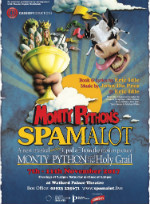 This show proved to be much more than just a stage adaption of Monty Python and the Holy Grail. It is a full-blown musical telling the tale of King Arthur and his Knights of the Round Table as they seek to locate the Holy Grail. With witty routines and clever updates to the script incorporating modern day references such as 'Watford' and your local sponsor 'Rennie & Co'. I wonder how much influence King Arthur had in that!
This show proved to be much more than just a stage adaption of Monty Python and the Holy Grail. It is a full-blown musical telling the tale of King Arthur and his Knights of the Round Table as they seek to locate the Holy Grail. With witty routines and clever updates to the script incorporating modern day references such as 'Watford' and your local sponsor 'Rennie & Co'. I wonder how much influence King Arthur had in that!
Director, Clare Gold is to be congratulated after delivering a hysterically funny and upbeat production from beginning to end.
This show acts as a great pastiche of musical theatre highlighted for example by the numbers 'The Song That Goes Like This' and 'You Won't Succeed in Showbiz'. The whole company gave such energy and enthusiasm throughout their performances as it was very clear to see that the show had succeeded in its mission as the audience where humming 'Always Look on the Bright Side of Life' on their way out of the theatre.
Musical Direction in the experienced hands of Susana Tierney only enhanced the production more and choreographer Owen Smith excelled in producing some clever choreography throughout, tailoring it just right for this company of dancers and singers.
 Walking into the auditorium and seeing the simplistic set of initials SBSBS, I just knew we were in for a fun evening.
Walking into the auditorium and seeing the simplistic set of initials SBSBS, I just knew we were in for a fun evening.
Director, Nikki Scott delivered a very well drilled cast of 14 with great energy and enthusiasm in an evening of Sondheim's, slightly earlier works, concentrating on the songs exploring conditions of relationships and the pain of love.
The clever cast wardrobe matching the colours of the sets initials was a very nice touch. Even after 40 years, the material may feel familiar, but it certainly hasn't lost its appeal and sparkle. As this was originally compiled for three people and a narrator the concept had to be altered slightly to accommodate the company who worked very well together.
Musical Direction and the informative narration was in the experienced hands of Martin Smith. Company singing was very good, with good clear diction. Choreography by Matt Fowler was delightful, simplistic but effective choreography throughout still managing the razzmatazz for the lack of big sets and props.
Who will ever now forget that huge drum in the 'You Got a get a Gimmick' number! Genius.
 The show's protagonist is Elle Woods, who follows her ex-boyfriend to Harvard Law School with the intention of winning him back, only to discover that doing so may be more difficult than she anticipated.
The show's protagonist is Elle Woods, who follows her ex-boyfriend to Harvard Law School with the intention of winning him back, only to discover that doing so may be more difficult than she anticipated.
Played by Joanne Goddard, Elle is a fun, loveable, larger-than-life character. Goddard steals the show with her quirky high-pitched speaking voice and dazzling smile, not to mention her incredible vocals. Her American accent was faultless and her pepped-up energy kept the show going even through the slower moments.
Elle's three best friends Serena, Margot and Pilar, played by Daisy Ausden, Hannah Chapman and Debbie Day, opened the show with a fantastic rendition of Omigod You Guys, their dynamic performances immediately pulling the audience into the high-energy world of the show. I confess I felt disappointed when Elle left them behind to go to Harvard, only to be delighted to find that they follow her there as a kind of Greek chorus for when our heroine has tough decisions to make.
Alongside Goddard, Kerry Lee as Paulette has the best voice in the show. A particular highlight was her hilarious song, Ireland, about her longing for a dependable Irish boyfriend, and whoever styled her costumes should be given a round of applause.
Matthew Bund as Warner Huntington III clearly grew in confidence as the show went on, delivering some great comic lines. Iain Doughty as shrewd law professor Callahan played a convincing villain.
Matthew Collyer as Emmett Forest was a great foil to Goddard's Elle. The two had real chemistry together and the ups and downs of their developing relationship were utterly believable to watch unfold.
The character of Brooke Wyndham, played by Hannah Farrer, felt a little underdeveloped but she shone in the time she did spend on stage, belting out her songs with a huge voice that filled the theatre. Huge credit for her for managing to sing without sounding breathless – while skipping.
Fans of the film will know, of course, about Elle's dependable pet, Bruiser the Chihuahua. In this show, Bruiser is played by a miniature dachshund, and Paulette's bulldog makes an appearance too, much to the delight of the crowd.
The songs were catchy and will definitely have you tapping your toes. The choreography was simple but effective and carried out with aplomb by the cast, who managed to make it look effortless.
This is a joyful show, full of hilarious moments that had the whole theatre rocking with laughter. Perhaps not always intentionally, but the cast never allowed that to faze them.
Be prepared to leave the theatre with these songs stuck in your head for days to come.
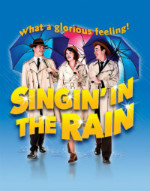 A little stardust on a winter's night does the world of good and Cassio Productions' cast sparkled and shone at the Palace Theatre and not just because of their dazzling bejewelled, silky and slinky costumes.
A little stardust on a winter's night does the world of good and Cassio Productions' cast sparkled and shone at the Palace Theatre and not just because of their dazzling bejewelled, silky and slinky costumes.
High production values are a trademark of this hard working company but last night they were West End worthy as the cast and crew barely put a foot wrong in their faithful stage adaptation of top five movie of all time Singing in the Rain.
Silent screen stars Don Lockwood (Matthew Bund) and Lina Lamont (Jeni Bolitho-Jones) are box office gold but as the 'talking pictures' loom their future is less certain, especially since Lina's voice is like fingernails down a blackboard. Step in Kathy Selden (Kathleen Paynter) who proves the perfect fit not only as voiceover artist but also as the love interest Don has been lacking in his life.
Choreographer Jo Bispham and director Nikki Scott have marshalled the chorus into a slick outfit, whether they are playing a crowd of cinema goers or executing a high-stepping ensemble routine such as Beautiful Girl or Broadway Melody.
What I absolutely love about Cassio is its inclusivity - there really is a place for all ages, shapes and sizes in their shows, if you can hit a top note, raise your thigh to the sky, dance the two-step or Make 'Em Laugh as the song goes, then you're in. Of the leads, Gareth Edwards as Cosmo Brown, along with Jeni and Matthew were funny, charming and very believable while Kathleen is simply mesmerising.
That goes for technical skills too Iain Syme's audio visual work on the silent film sequences deserves high praise as does Martin Smith's rousing musical direction which saw the orchestra playing from the heavens rather than down in the pit.
The title song was a little bit of a let-down technically and the second half as a whole could have been tighter. However, it was such a thoroughly entertaining and delightful evening that near perfect will do very well indeed, thank you.
 Straight from the opening bars of this high-octane production Cassio takes us on a roller-coaster ride through the sounds and sights of New Jersey circa 1985 when cheesy love songs were the best currency in town.
Straight from the opening bars of this high-octane production Cassio takes us on a roller-coaster ride through the sounds and sights of New Jersey circa 1985 when cheesy love songs were the best currency in town.
Adapted from the movie starring Adam Sandler, the stage version of ‘The Wedding Singer’ is a light-hearted musical comedy which pays tribute to the world of cop shows, Vegas weddings, power pop and bubble perms.
Robbie Hart (Mathew Collyer) is an optimistic wedding singer who is looking forward to tying the knot with his beloved fiancée Linda (Kerry Lee). At a wedding party he meets a waitress named Julia (Kathleen Paynter) who also can’t wait to enjoy some wedded bliss, if only her beau Glen (Matthew Bund) would pop the question – and gasp, he soon does. Julia helps Robbie pen a love song for his lady love, but his hopes for nuptial nirvana are quashed when Linda leaves him at the altar.
Distraught, Robbie messes up his next wedding gig and, lowest of the low, ends up in a dumpster. Thankfully, Julia is on hand to cheer him up and after some misunderstandings the two realise they are right for each other and no one else.
The songs are not memorable; ‘Casualty of Love’ and ‘If I Told You’ are just recognisable and the plot is thin, but thankfully none of that matters as overall it’s an entertaining show and this semi-professional group could pretty much make anything look, feel and sound incredibly good.
Sharing most of the laughs are Gareth Edwards and Iain Doughty as Robbie’s band members and Julie Lilley as Robbie’s very sprightly grandma Rosie. Also putting in strong performances are Jeni Bolitho-Jones as Holly, Debbie Day as the bride and Kerry Lee as the wonderfully acerbic Linda. Mathew Collyer and Kathleen Paynter are very well matched leads with a lot of natural chemistry, but then as the programme hints, they may well only have eyes for each other in real life as well as on stage – swoon.
‘The Wedding Singer’ may be frothy but it’s fun and what makes this production stand out most of all is Jo Bispham’s en pointe choreography where everybody knew and made their mark. Musical Director Rob Wicks also conjured forth some pitch perfect singing and director Nikki Scott, whose production of ‘The Hired Man’ I so much admired, has triumphed again by bringing the whole thoroughly entertaining evening together.
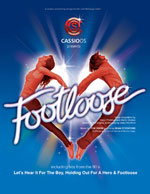 This was an explosive show, full of fun, joy, dynamic dance and uplifting performances. The audience were knocked off their seats by the music and the sheer exuberance of the massive cast. Nobody could have nodded off for a second and my eyes were riveted all over the stage as each scene evolved. Director and Choreographer Martyn Knight brought his vast experience to the staging and performance of each brilliant dance number, all of which could not be faulted.
This was an explosive show, full of fun, joy, dynamic dance and uplifting performances. The audience were knocked off their seats by the music and the sheer exuberance of the massive cast. Nobody could have nodded off for a second and my eyes were riveted all over the stage as each scene evolved. Director and Choreographer Martyn Knight brought his vast experience to the staging and performance of each brilliant dance number, all of which could not be faulted.
Adrian Barrett as Rev Moore gave a strong performance as the town pastor, a decent family man with many pent up emotions. He was well supported by his wife Vi, played by Alison Saggars. Her number, “Can you Find it in your Heart” was beautifully sung. Their daughter Ariel was beautifully and sensitively played by Jeni Bolitho-Jones. Jeni is a great natural mover and all her songs were well sung, especially “Almost Paradise” with Ren. Ren was the boy she finally ended up with and this role was exceedingly well portrayed by Harrison Evans. Here was a welcome newcomer to Cassio playing the rebellious troubled teenager to perfection, with great, energetic dancing. He sang well and I loved the humour he brought into the budding friendship with Willard.
The vivacious, gutsy performance of Daisy Ausden as Rusty lit up the stage whenever she was on, so full of energy and mixed up teenage emotions. Again a talented newcomer to Cassio. The boy she finally got together with was Willard, superbly played by Matt Bund. I would like to give this young man an Oscar for his performance as he so cleverly evolved into the confident young man Rusty wanted him to be. What a star!
Far too many to mention but deserving much praise are the smaller cameo roles and the ensemble. They all came across as individual characters plus the dancing of the chorus numbers was out of this world, just brilliant. They moved with marvellous precision and sang the musical numbers beautifully with great harmonies.
This was a most unusual show for Cassio but it paid off enormously and was a great production.
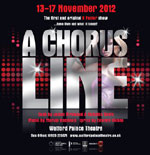 THIS musical, with music by Marvin Hamlisch, is popular with amateur operatic societies, perhaps because of its unusual requirements. The plot, such as it is, concerns the selection of four female and four male dancers from a crowd of applicants for the chorus of a stage musical, so there are many small but important parts, and all the cast - not only the two or three major characters - must both dance and sing.
THIS musical, with music by Marvin Hamlisch, is popular with amateur operatic societies, perhaps because of its unusual requirements. The plot, such as it is, concerns the selection of four female and four male dancers from a crowd of applicants for the chorus of a stage musical, so there are many small but important parts, and all the cast - not only the two or three major characters - must both dance and sing.
From the opening sequence, in which the system of auditions is explained by the director, Zach, it was clear that Cassio Operatic Society had assembled an experienced and talented cast, all whom deserve praise.
Adrian Barrett, who played Zach, has a good pedigree in Watford productions, and his testing and ultimate selection of his chorus is very believable. Of the women's roles, perhaps the most notable is Cassie, who has had a previous relationship with Zach; Emma Stratton sings and dances the part well, and copes with the extended sentimental scene with him.
Essentially, A Chorus Line is about the varying fantasies and neuroses of all the would-be chorus members. There are various ingenious touches in the production by Martyn Knight, who directs and choreographs. He had taken much trouble to ensure that the dancing and singing all achieved excellent ensemble. As the audience arrives, there is no curtain, and the cast are seen limbering up. The orchestra is quite small, and is concealed behind the backdrop. Mirrors are used to suggest a larger number of performers on stage.
Zach spends most of his time among the audience - ultimately any stage production is intended for us, not just as an ego-trip for the performers. The coup de theatre at the end, when the successful applicants are identified, has its proper effect.
A Chorus Line is neither great drama nor great music: it is a melodrama in the form of modern dance and with rock song. Cassio OS is to be congratulated on a memorable production.
 Hello, Dolly! - It’s just a load of frothy tosh, fluff and nonsense and as such it was utterly delightful to sit back and soak it up last Monday night at Watford Palace Theatre.
Hello, Dolly! - It’s just a load of frothy tosh, fluff and nonsense and as such it was utterly delightful to sit back and soak it up last Monday night at Watford Palace Theatre.
Cassio Operatic Society, under the directorial guidance of Chris Cuming, has created a colourful, vibrant production that was a pleasure to watch.
Julie Lilley plays the matchmaker Dolly Levi superbly and delivers a very glamorous, foxy performance and her ultimate prize, Horace is played with equal style by Jeff Eales.
Hello, Dolly! is a thoroughly enjoyable romp through memorable songs and it was great to see so many young members in the cast and chorus, singing and dancing with such enthusiasm, confidence and technique. Well done Cassio.
Gareth Edwards was perfect as the hapless shop assistant footloose in New York and his partner in crime, Stephen Smith worked impeccably well with Georgia Inett. They both managed to present and play a really convincing, well choreographed couple.
For me though, Mrs Molloy, played by Fiona Wilkie really made her mark when she sang her first number, Ribbons Down My Back. She performed to perfection and I’m sure we’ll be seeing a lot more of her in the future.
If I had one moan, it would be that the set seemed to get in the way of the action and I’d have preferred the ten-piece band, brilliant as they were, to be in the pit and not on stage. They were a bit of a distraction and from time to time, overpowered the artists singing. Something I’m sure they will solve as the run progresses.
All in all though, an entertaining, spectacular evening. Real escapism in true musical tradition.
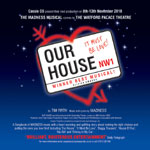 THE Camden-based band Madness were one of the best-selling British bands of the 80's and this musical features many of their beloved hit songs. Cassio Operatic Society does its enthusiastic best with a play that is, at best, a series of tenuous links strung together purely on the strength of the music.
THE Camden-based band Madness were one of the best-selling British bands of the 80's and this musical features many of their beloved hit songs. Cassio Operatic Society does its enthusiastic best with a play that is, at best, a series of tenuous links strung together purely on the strength of the music.
Our protagonist Joe Casey (Matt Fowler) is celebrating his 16th birthday and to impress his date Sarah (Saoirse Brewer) makes an impulsive decision, which will colour the rest of his days. We follow Joe, his friends and his widowed mother through two alternative life-paths stemming from his actions on this fateful night. Accompanying Joe on both these journeys is his late father (Adrian Barrett) who looks on in dismay as Joe makes similar mistakes to those which led to his own untimely demise.
Unfortunately, the flimsy plot-line lurches tediously from one preposterous scenario to another, and despite amiable performances and some timely comic delivery, especially from the excellent Emmo and Lewis (Sam Gaines and Gareth Edwards) as Joe's hapless mates, this musical is a real wasted opportunity. The songs Madness wrote had a clear narrative (House of Fun, about the joyful coming of age and Embarrassment, written about the shameful treatment of young mothers of mixed race babies) but writer Tim Firth, seems to have side-stepped the obvious in favour of the absured.
Cassio Operatic Society show its usual enthusiasm and the ensemble numbers especially shine, giving this play a much needed boost.
It is truly down to this talented cast and the strong score that this musical remains watchable.
One is left with the feeling that the insubstantial plot could have been dispensed with altogether and the evening would have been all the more enjoyable.
 A Diamond anniversary deserves a sparkling performance and Cassio Operatic delivered one with aplomb at an extremely well attended (despite the rain-sodden conditions) matinee show last Saturday.
A Diamond anniversary deserves a sparkling performance and Cassio Operatic delivered one with aplomb at an extremely well attended (despite the rain-sodden conditions) matinee show last Saturday.
Directed by Nikki Scott, the show is successfully updated from the ‘20s to the ‘50s, where small town America is still marching to its own tune, but the era provides a lot of scope for colour and fun in the costume and choreography department. The Composite town set is a joy to behold in itself.
Slippery salesman Harold Hill, given the razzle dazzle by tap-dancing actor Stewart Jordan, falls for librarian Marian Paroo, given fine voice by Cassio stalwart Julie Lilley. Since the cast changes vary from performance to performance, it would be unfair to single out other players, but all concerned did brilliantly with mastering the American accents and the fantastic, Busby Berkeley-style dance routines on numbers such as Marian The Librarian and Ya Got Trouble. The talented band and vintage lady dancers also deserve note.
All that remains, is to wish Cassio many happy returns and give thanks for a thoroughly entertaining show from one of the area’s most accomplished companies.
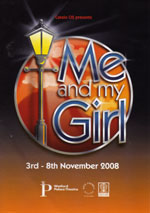 Cassio Operatic has been a regular at the Palace Theatre for decades now and enjoys an enviable reputation among Watford audiences. With literary tweaks from Stephen Fry, the Cassio cast hit the ground running with this production of the 1930s’ classic musical Me and My Girl.
Cassio Operatic has been a regular at the Palace Theatre for decades now and enjoys an enviable reputation among Watford audiences. With literary tweaks from Stephen Fry, the Cassio cast hit the ground running with this production of the 1930s’ classic musical Me and My Girl.
The story of a cockney costermonger who unexpectedly discovers he is to be an earl has more than a whiff of My Fair Lady about it and has an equally impressive catalogue of songs, including the famous Lambeth Walk.
Kicking off with a fabulously rousing overture, Phillip Joslin conducted a faultless and bright orchestra throughout. Adrian Barrett (director) and Victoria Spicer (choreographer) set the bar high with an inventive opening and an impressive clutch of principals who, combined with the enthusiastic and impeccably drilled chorus, glam costumes and swift scene changes, ensured a chirpy and cheery evening.
As Bill Snibson, the cheeky chappy who is elevated to the peerage, the talented Matt Fowler was charming, with his onstage presence being nothing less than magnetic. He displayed great comedic flair and danced with an enviably assured precision. Bill’s cockney girlfriend (Sally) was deemed unsuitable by his new relations, and the gamine Bobbie Chatt positively sparkled as Sally Smith. Her interplay with Bill was sincere while her touching rendition of Once You Lose Your Heart was the perfect vehicle to showcase her strong vocal talent.
Formidable support was offered by seasoned actor Ian Parrot (Sir John), with facial gymnastics aplenty from Stewart Jordan (Gerald) and Lucy O’Hare (Lady Jacqueline), who enjoyed stealing the deliciously saucy sofa scene. Spot On!
 Melvyn Bragg’s Cumbrian tale of The Hired Man, scored for the stage by Howard Goodall is an ambitious and mesmerising piece of musical theatre, but this proved no obstacle for Cassio Operatic Society on Monday night.
Melvyn Bragg’s Cumbrian tale of The Hired Man, scored for the stage by Howard Goodall is an ambitious and mesmerising piece of musical theatre, but this proved no obstacle for Cassio Operatic Society on Monday night.
The Hired Man (which was awarded the Ivor Novello Award for Best Musical in 1984 and earned four Olivier Award nominations) is basically a love story set against a harsh life of manual labour at the turn of the last century.
John Tallentire (Russell Stratton) has been taken on as a farm worker for Pennington’s. His wife Emily (Emma Southorn) joins him and together they set about starting a new life away from the gossip about their hasty marriage and baby on the way. However, isolated and neglected by her spouse, Emily soon falls for the attentions of her employer’s son Jackson Pennington (Stewart Jordan) and their world is torn apart.
Given that this was the opening evening of the show, which runs until Saturday at Watford Palace Theatre, the performances were pretty flawless. The less robust songs Now For The First Time and You Never See The Sun didn’t come across so well as the rousing Song Of The Hired Man, the poignant If I Could and the absolutely heartrending portent of What Would You Say To Your Son?, but packing so much emotion into under three hours is no mean feat.
The story takes us from a healthy but hard life working the fields to the horrors of the First World War front line and down the pits where so many lost their lives in peacetime.
The rite of passage from personal freedom to collective duty (both as miners joining the union and as soldiers in the army) was clearly felt.
Cassio paint this broad canvas with brilliant ensemble pieces and deft imaginative use of the stage – the pit seam hacked out at the back and trenches made from staging blocks being particularly of note. Knowing the lead players Stratton and Southorn are partners in real life is no slight on their acting talent, both delivered excellent and passionate performances as husband and wife and Matthew Gregory as Isaac and Stewart Jordan as Jackson deserve special mention.
The highest praise through must go to the band, under the musical direction of Martin Smith, they simply blew us away with their recreation of an England struggling to span the gap between a rural and industrial nation.
 A spotlight scours the stage, the orchestra throws off some pulsing rock licks and behind me, a grey-haired theatregoer announces: “Oh, dear, I don’t think I’m going to like this.”
A spotlight scours the stage, the orchestra throws off some pulsing rock licks and behind me, a grey-haired theatregoer announces: “Oh, dear, I don’t think I’m going to like this.”
And so Jesus Christ Superstars opens with grinding guitars, flashing lights and a mist-shrouded Messiah standing on some heavily bondaged industrial scaffolding.
It’s a departure for the Palace Theatre, their first Lloyd-Webber musical and for Cassio Operatic Society, whose previous outings on this stage have included more demure productions of Fiddler on the Roof and The King and I.
But this performance is a breath of fresh air from the cheeky costumes and neatly executed dance routines, to the astonishing range of soon-to-be teenage heartthrob Daniel Barry, as Jesus.
I make this claim judging from the reaction of my 12-year-old daughter, Eve, who was a little unsettled by the torture scenes and declared it all a bit too loud, but clearly was impressed by the power of the lead character’s voice and stage presence, not to mention the sheer spectacle of the show.
Julie Lilley gives a deftly measured performance as Mary Magdalene caught between wanting to mother Jesus and be his paramour and Peter St James delivers a gusty denial of Christ in the Garden of Gethsemane, but it is Judas and Jesus that shine. Russell Stratton is moody, mean and yet infinitely human as Christ’s leather-trousered betrayer, belting out the numbers with gusto, while Daniel Barry reaches rock god heights with his rich and breathy delivery and finely honed pop idol torso.
Special mention must, of course, go to Adrian Barrett for presenting such an atmospheric and powerful show as his directorial debut. Even the row behind were smiling benevolently by the end.
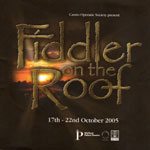 The precarious nature of living in Tsarist Russia – for its Jewish community, the metaphorical equivalent of the fiddler on the roof – was explicit for all to see at the Palace Theatre on Monday night.
The precarious nature of living in Tsarist Russia – for its Jewish community, the metaphorical equivalent of the fiddler on the roof – was explicit for all to see at the Palace Theatre on Monday night.
Fiddler on the Roof is set in the small Russian village of Anatevka in 1905. The opening scene, vividly staged and sung with great gusto by the ensemble cast of Cassio Operatic Society tells the audience of the importance of tradition in Anatevka, as exemplified by the wearing of tzitzits and tallesim, or prayer shawls. The rigid family structure is also strictly defined, with definite roles for the papas, the mamas, the sons and the daughters.
The Jewish community in Anatevka is proud of its heritage and is unwilling to see its way of life changed. Slowly, however, as the musical progresses, modern life creeps in, Alongside this is a growing sense of fear at the impending oppression, signified by the menacing march of the Russians in their heavy black boots.
Tevye, the milkman, acts as our guide. Played with consummate expertise by David Rosen, we really get a sense of who this man is. By appealing directly to God through the audience and telling us his inner thoughts in numerous asides, his complex and likeable character is laid bare. David’s character always has a twinkle in his eye, presenting a highly believable person and someone with whom everyone can empathise. His knowing looks to the audience also give us the sense of being part of the action ourselves, rather than passive spectators.
Teyve’s wife Golde, played by Nicky Chryssaphes to great effect, is the classic housewife, devoting 25 years of her life to the service of her husband and five daughters. She knows her role in life and sees no future outside of it for her. The best she can hope for is that one her daughters will marry a rich man.
The five daughters – Gillian Harman, Natalie Pearlman, Natalie Giacone, Chloe Pamplin and Amy Lovel – have their own ideas, however. Gillian and the two Natalies bring a real sense of youthful innocence to their roles, as they each fall for unsuitable men in the eyes of their parents.
The three actors who play their lovers – Jeremy Cohen as Motel, Daniel Barry as Perchick and Joseph Giacone as Fyedke – show a gravitas and stage presence belying their years, while Adrian Barrett, as the butcher Lazar Wolf, brilliantly conveys the jilted suitor.
From the talented xast of supporting actors, three stood out above the rest. Chrissie Pryke as Yente, the matchmaker, had everyone in stitches, Barry Kemp, as Nachum the begger, kept in character beautifully and Mark Sindall, as the constable, was a tough jobsworth with a sensitive side.
The production design by Martin Smith, wardrobe by Jane Forster, music conducted by Ian Scleator and choreography by Emma Southorn, were a joy throughout. A few words were lost, sets walked into and light cues missed, but this can be put down to first night nerves and in no way detracted from a wonderful show.
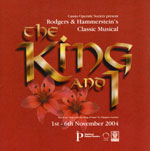 The audience screams in terror as the cymbals thunder in the sold-out Watford Palace Theatre. Relieved laughter fills the room as the lights dim and the curtain rises as conductor Martin Smith plays the first in a number of consistently high quality pieces.
The audience screams in terror as the cymbals thunder in the sold-out Watford Palace Theatre. Relieved laughter fills the room as the lights dim and the curtain rises as conductor Martin Smith plays the first in a number of consistently high quality pieces.
Anna Leonowens (played by Julie Lilley) and her son Louis (Daniel Saggers) have just arrived in Siam of the early 1860’s and are greeted by the Kralahome (Paul Woodstock).
Anna has been hired to teach the King of Siam’s children but soon her duties grow to include advising him on affairs of state and avert a possible British invasion.
Leonowens naturally and very convincingly plays a confident by sensual 19th Century woman, credibly communicating the tempestuous love-hate relationship she has with the King. Her gaze is fixed on the audience as she bitterly complains, in flawless song, about the King in Shall I Tell You What I Think?
Equally exceptional is the acting by Robert Milner, who has the necessary gravitas to vividly bring to life a despotic, smug and harsh ruler with a thundering and well-trained voice but yet a soft core.
An exceptional singing voice is also the gift of Emma Southorn, in the role of Lady Thiang, and she relishes the audience’s admiration in Something Wonderful.
Nicholas Corre and Natalie Giacone, as Prince Chulalongkorn and Tuptim respectively, play with remarkable confidence for their age.
The attention to detail, such as patterned shadows (lighting design courtesy of Ian Saunders) on the floor the give the show an Eastern Flair, as well as elaborate costume masks, especially the villain in the play-within-a-play The Small House Of Uncle Thomas, are comparable with most professional productions. This is also where the quality of the musical’s choreography (Lisa Harrison-Jones) and direction (Nikki Scott) is shown off at its best.
On the negative side there is not much to say. There were no first-night jitters and no fluffed lines. However, on the opening night, the singing by some of the younger cast members was a bit on the soft side, and at times they were nearly drowned out by the orchestra.
Nevertheless, the King and I is a perfect opportunity to say hello to the new-look Watford Palace Theatre. What a treat.